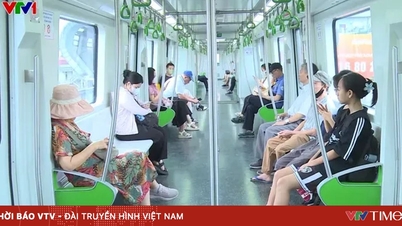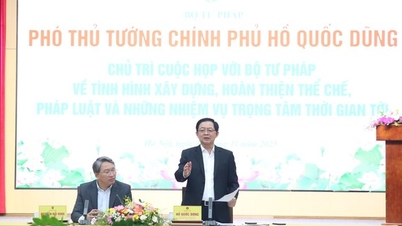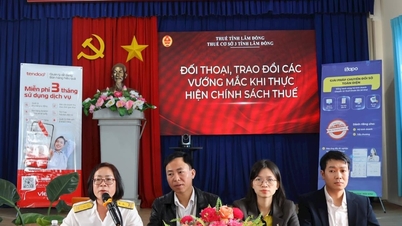
Dr. Doan Huu Tue: "Cutting down 25 conditional business lines is an important shift in management thinking" - Photo: VGP/Giang Oanh
Important opportunity to remove bottlenecks
This morning, November 11, Minister of Finance Nguyen Van Thang, authorized by the Prime Minister, submitted to the National Assembly the draft Investment Law (amended). According to the Minister, this amendment to the law aims to remove difficulties, simplify investment and business procedures and create favorable conditions for people and businesses.
In the draft, the Government proposed to cut 25 conditional business lines, meaning they do not need to apply for a business license; including accounting services, rice export, and temporary import and re-export of frozen foods...
The above proposal of the Government immediately attracted great attention from the business community and policy researchers. This is not only a technical move in the process of administrative procedure reform, but also an important shift in management thinking, towards promoting business freedom, minimizing compliance costs, and at the same time creating a more transparent, open and effective business environment.
As an economic expert who has been following the investment environment reform process for many years, Dr. Doan Huu Tue believes that this proposal will have many positive meanings if it is implemented synchronously and systematically to promote the highest efficiency and meet the expectations of the business community.
According to Mr. Tue, first of all, the reduction of business licenses can be seen as an important opportunity to remove long-standing bottlenecks. According to the Investment Law 2020, there are 234 conditional business lines, many of which require businesses to apply for a license before operating. This causes businesses to spend a lot of time and money on compliance, unintentionally creating unnecessary pressure, especially for small and micro businesses.
On the other hand, the post-audit mechanism is a modern management method that has been used by many countries to balance business freedom and state management requirements. The shift from pre-audit to post-audit does not reduce management standards, but only changes the time and method of supervision. Instead of checking before the business operates, the management agency will focus on monitoring the operation process and only handle when there are risks or signs of violations.
"This approach promotes the autonomy and self-responsibility of enterprises, while helping the management apparatus focus resources on more necessary tasks. If this proposal is approved and thoroughly implemented, Vietnam will have a transparent, flexible business environment and money closer to international practices," said Mr. Tue.
For this proposal to be most effective, expert Doan Huu Tue emphasized that its implementation requires serious preparation.
"First of all, in my opinion, it is necessary to review and make transparent the entire list of industries with reduced licenses. This list needs to be widely and uniformly announced on the information portals of the Government and relevant ministries and branches, to help businesses clearly understand their rights and obligations when operating under the new mechanism. Not only that, it is also necessary to consult businesses, industry associations and independent experts to ensure that the list of industries with reduced licenses is consistent with the actual situation and avoid the situation of changing business conditions but not really reducing the burden on businesses," Mr. Tue proposed.
When moving from pre-inspection (pre-licensing) to post-inspection (monitoring during and after operations), there needs to be a mechanism to ensure that businesses are free to operate while maintaining safety, quality and responsibility standards. To achieve these two goals at the same time, the post-inspection system needs to be designed on the basis of a clear legal framework and transparent criteria; in which it is necessary to establish a set of minimum standards that businesses are required to comply with (product safety, environment, professional competence, technical conditions, etc.). On the other hand, the management agency needs to issue detailed instructions on how businesses self-control, self-declare and self-responsibility.
In addition, the modern post-audit mechanism needs to be based on a system of classifying enterprises according to their risk level (field, scale, output, compliance history, abnormal indicators from data, etc.), avoiding overlapping, duplication, and widespread inspections, causing trouble for enterprises.
"A transparent, scientific and consistent post-inspection system will help businesses focus on production and business activities," Mr. Tue emphasized.
In particular, to operate effectively, the post-inspection mechanism needs a connected data system and digital technology based on a shared database between ministries, branches and localities; applying artificial intelligence to data analysis to promptly detect risks and warn of abnormalities with the goal of accurate and quick post-inspection and eliminating negative developments.
In addition, along with the reduction of licenses, it is necessary to implement activities to support businesses, especially small and micro enterprises. Many businesses may not be familiar with the post-audit mechanism, so guidance, training and information provision are essential. Mr. Tue recommended building a digital platform for businesses to look up all legal requirements related to their industry, and at the same time support the registration of necessary procedures online. When information is standardized and easily accessible, businesses will reduce the risk of violations and improve compliance.
Another important point that this expert repeatedly mentioned is the need to evaluate the impact of the policy over a certain period of time. After 12 to 18 months of implementation, the competent authority should compile data on market entry time, the number of new businesses, the reduction in compliance costs and the level of business satisfaction. These data will help the management agency determine whether it is possible to continue to expand the scope of cuts to other industries. Periodic evaluation helps the policy not only be correct but also accurate, in line with the fast-moving reality of the economy.
It can be seen that the reduction of business licenses is a suitable step in the trend of modernizing state management and improving the quality of Vietnam's business environment. However, the effectiveness of this step depends on the implementation. If we ensure transparency, synchronization, an effective post-audit system, business support activities and regular impact assessments, this proposal will become an important driving force to promote investment, innovation, reduce costs and increase the competitiveness of the economy.
In the context of Vietnam aiming for rapid and sustainable development, this expert believes that improving the business environment in general and reducing licenses in particular is not only about reducing procedures, but also the foundation for businesses to be more proactive and confident when entering the market; thereby contributing more positively to growth and enhancing the national position. "This is an opportunity for us to continue to affirm the spirit of strong reform, while creating momentum for the economy in the new period," said Mr. Tue.
Giang Oanh
Source: https://baochinhphu.vn/de-xuat-giam-giay-phep-kinh-doanh-25-nganh-nghe-buoc-tien-trong-cai-thien-moi-truong-dau-tu-102251111134925376.htm



![[Photo] Prime Minister Pham Minh Chinh receives Lao Minister of Labor and Welfare Phosay Sayasone](https://vphoto.vietnam.vn/thumb/1200x675/vietnam/resource/IMAGE/2025/11/11/1762872028311_dsc-2246-jpg.webp)

![[Photo] Chu Noodles - the essence of rice and sunshine](https://vphoto.vietnam.vn/thumb/1200x675/vietnam/resource/IMAGE/2025/11/11/1762846220477_ndo_tl_7-jpg.webp)






















































































![Dong Nai OCOP transition: [Article 3] Linking tourism with OCOP product consumption](https://vphoto.vietnam.vn/thumb/402x226/vietnam/resource/IMAGE/2025/11/10/1762739199309_1324-2740-7_n-162543_981.jpeg)








Comment (0)